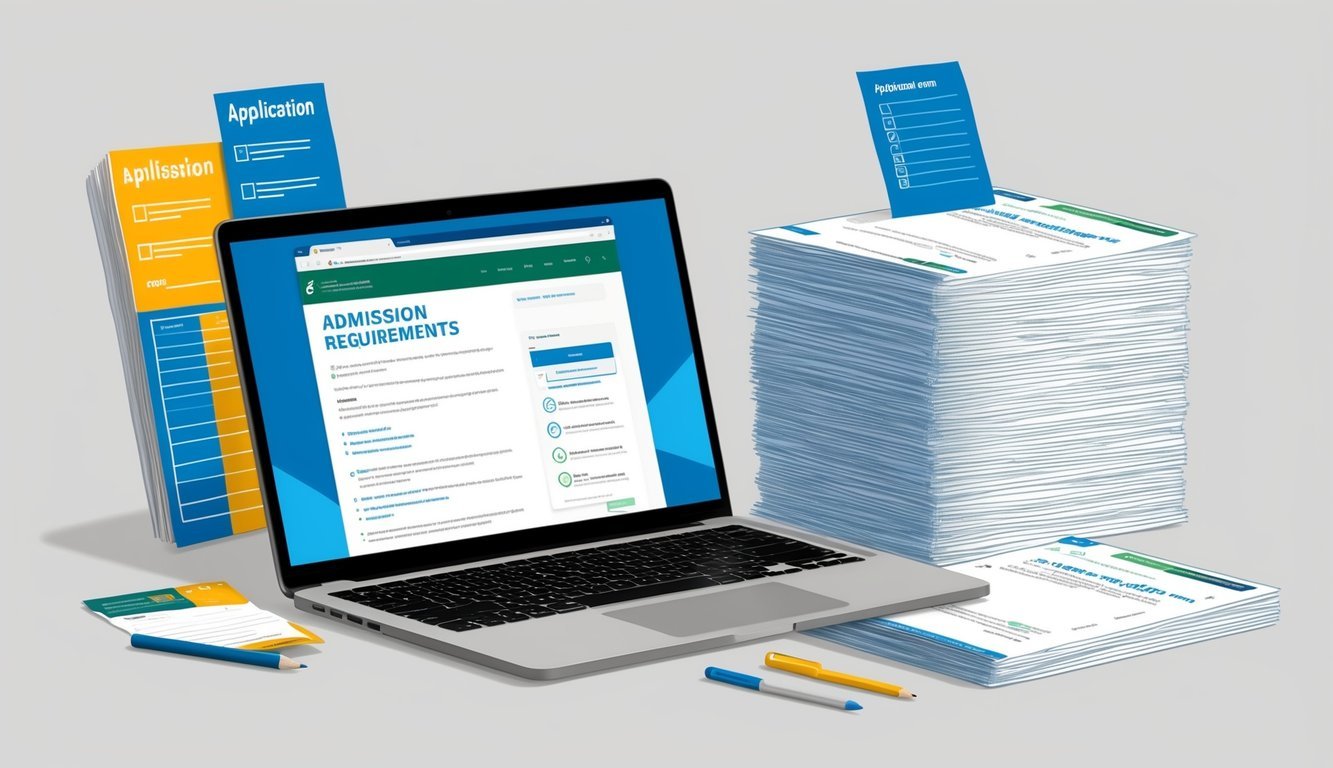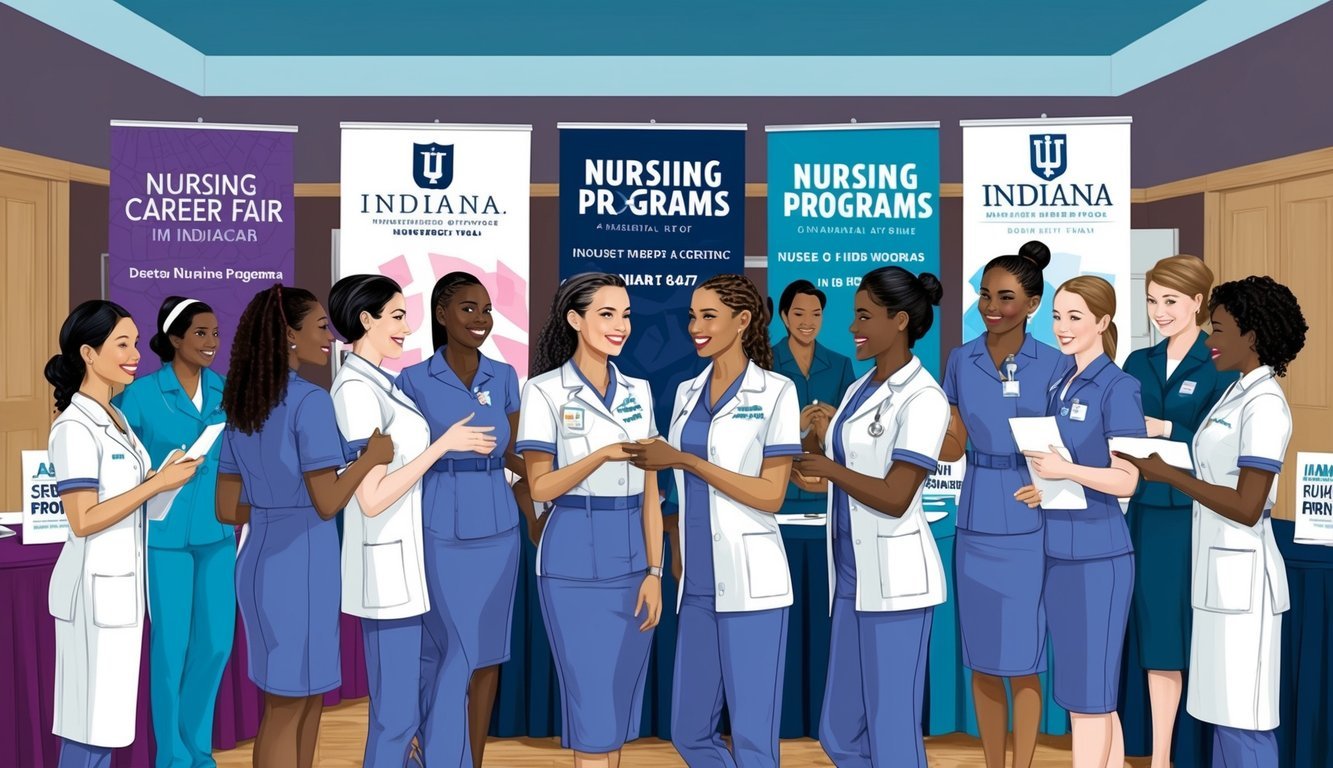Accelerated nursing programs in Indiana offer a fast track for individuals looking to transition into the nursing field.
These programs are designed primarily for those who already hold a bachelor’s degree in another discipline.
They provide a path to earn a Bachelor of Science in Nursing (BSN) in a shorter time frame, often within 15 to 18 months. If you are seeking a rewarding career in nursing without spending years in school, exploring these accelerated programs could be your best option.
These programs combine rigorous coursework with practical clinical experiences.
As a student, you will engage in both online and in-person classes, ensuring that you receive a well-rounded education.
Financial aid options are often available, making it easier for you to manage the costs while pursuing your nursing degree.
You might be wondering about the job opportunities after completing the program.
Many graduates successfully find positions in hospitals, clinics, and various healthcare settings shortly after graduation.
Joining an accelerated nursing program can set you on a fulfilling career path, providing the skills and knowledge needed in today’s healthcare environment.
Key Takeaways
- Accelerated nursing programs allow you to earn a BSN quickly, often in 15 to 18 months.
- Many programs offer financial aid options to help manage the costs.
- Graduates have strong job prospects in various healthcare settings post-completion.
Understanding Accelerated BSN Programs

Accelerated Bachelor of Science in Nursing (ABSN) programs are designed for individuals who already hold a bachelor’s degree in another field.
These programs allow you to earn a nursing degree in a shorter time frame, typically 12 to 18 months.
What is an ABSN?
An Accelerated Bachelor of Science in Nursing (ABSN) program is a fast-paced nursing education track.
It is tailored for students who possess a non-nursing bachelor’s degree.
This format focuses on intensive coursework and clinical practice.
Students participate in both theoretical learning and hands-on training in healthcare settings.
The curriculum usually covers key areas such as:
- Health Promotion
- Patient Care
- Nursing Research
Upon completion, graduates are prepared to take the NCLEX-RN exam to become licensed registered nurses.
This format is ideal for those looking to shift careers into the nursing profession.
For additional details, you can explore Indiana University School of Nursing’s Accelerated BSN track.
Benefits of Accelerated BSN
Accelerated BSN programs offer several advantages.
Here are some key benefits:
- Time Efficiency: You can complete your nursing degree quickly, often in 12 to 18 months.
- Career Transition: This program allows for a seamless shift into the nursing career if you already have a degree.
- High Demand: The nursing profession is always in demand, increasing job security.
- Holistic Learning: Programs often emphasize health promotion and patient-centered care.
Additionally, many ABSN programs include flexible online components and full-time study options.
This lets you balance personal and professional commitments while pursuing your nursing career.
For further insights, check the University of Indianapolis ABSN Online Track.
Admission Requirements and Application Process

When entering an accelerated nursing program in Indiana, understanding the admission requirements and application process is crucial.
Each program may have specific guidelines, but certain common factors will guide you through this journey.
Prerequisite Courses
Before applying, you must complete specific prerequisite courses.
Most programs require courses in subjects like biology, chemistry, microbiology, and anatomy.
Typical prerequisites include:
- Introduction to Biology
- Chemistry for Health Sciences
- Human Anatomy and Physiology
- Statistics
Make sure to check the exact list required by the program you are interested in, as some schools, such as Indiana University-Purdue University, Indianapolis, might have unique requirements.
Successfully completing these courses provides you with a solid foundation for nursing studies.
Minimum GPA and Test Scores
A competitive GPA is essential for admission.
Most accelerated nursing programs require a minimum GPA of 2.75 to 3.0 on a 4.0 scale.
However, more selective programs might expect higher scores.
In addition to GPA, some programs may require standardized test scores like the TEAS (Test of Essential Academic Skills).
Preparing for this test can significantly enhance your application.
Check with your prospective school for their specific criteria.
Application Deadlines
Being aware of application deadlines is vital.
Most programs have set deadlines for application submissions, often falling between November and March for fall admissions.
It is advisable to prepare your application materials early, including:
- Official transcripts
- Letters of recommendation
- Personal statements
Regularly check the program website, as deadlines may vary by institution.
Some programs may offer rolling admissions, allowing you to apply at different times throughout the year.
Always confirm the latest deadlines on the university’s website to ensure your application is submitted on time.
Curriculum and Clinical Education

In accelerated nursing programs, the curriculum is designed to provide you with essential knowledge and skills while ensuring you gain practical experience in various healthcare settings.
This section covers key components of the nursing curriculum and the importance of clinical hours for your education.
Core Nursing Courses
The core nursing courses in an accelerated program cover vital subjects that prepare you for real-world nursing challenges.
Key areas of focus include:
- Health Assessment: You will learn to conduct thorough patient evaluations, which is crucial for effective patient care.
- Pharmacology: Understanding medications, their effects, and proper administration techniques helps ensure patient safety.
- Microbiology: Knowledge of microorganisms and their impact on health is fundamental for infection control.
Your coursework will combine lectures, hands-on labs, and group discussions to help you understand complex concepts.
Programs usually emphasize critical thinking and effective communication, which are essential in nursing practice.
Clinical Hours and Experience
Clinical hours are a cornerstone of your nursing education.
They provide practical, hands-on experience in real healthcare environments.
Here’s what you can expect:
- Patient Care: You will work directly with patients under the supervision of licensed nurses, applying your classroom learning.
- Diverse Settings: Clinical placements may include hospitals, clinics, and community health organizations, allowing you to experience various nursing specialties.
Students typically complete between 500 to 1,000 clinical hours during their programs.
These experiences enhance your skills in patient assessment, care planning, and intervention.
They also help build your confidence and prepare you for the NCLEX-RN exam.
For additional details on specific programs, you can explore resources like Accelerated Nursing Programs in Indiana.
Tuition, Financial Aid, and Support Services

Understanding the costs associated with accelerated nursing programs is crucial for planning your education.
You’ll also want to explore available scholarships and financial aid options.
Finally, support services can enhance your learning experience and help you succeed.
Understanding Tuition Costs
Tuition costs for accelerated nursing programs in Indiana can vary by institution.
On average, you might expect to pay between $30,000 and $50,000 for the entire program.
This figure usually includes tuition, fees, and sometimes even materials.
It’s essential to check the specific tuition rates for each program.
For example, Indiana University-Purdue University, Indianapolis may have different rates compared to University of Indianapolis.
You might also incur additional costs such as:
- Textbooks
- Clinical supplies
- Insurance fees
Understanding these factors will help you budget effectively.
Scholarships and Financial Aid
Various scholarships and financial aid programs are available for nursing students in Indiana.
Here are some options to consider:
- Federal Financial Aid: Complete the FAFSA to determine your eligibility for federal grants and loans.
- State Scholarships: Indiana offers state-based scholarships for nursing students. These can greatly reduce your financial burden.
- Institutional Scholarships: Many universities have their own scholarship programs. Check with the financial aid office for details.
You can also explore external scholarships based on merit, need, or specific criteria.
Programs like Nursing Process may list various scholarship opportunities.
Academic and Career Support
Support services play a vital role in your success.
Most institutions offer academic advisors who can help you navigate your coursework.
You can meet regularly with a Student Success Advisor to discuss your academic goals and any challenges you encounter.
Additionally, schools often provide resources like:
- Tutoring Services: Get extra help in subjects like pharmacology or anatomy.
- Career Counseling: Access guidance for job placement and resume writing upon graduation.
- Networking Opportunities: Connect with professionals in the nursing field through workshops and events.
Utilizing these services will help strengthen your academic performance and increase your career readiness after completing your program.
Career Outcomes and Alumni Network

Accelerated nursing programs in Indiana prepare you for various career opportunities while providing a strong alumni network.
These connections can enhance your job prospects and support your professional growth.
Employment Opportunities After Graduation
Graduates of accelerated nursing programs often find diverse employment opportunities in the healthcare industry.
You can work in hospitals, clinics, nursing homes, and community health organizations.
Common Employment Settings:
| Setting | Job Roles |
|---|---|
| Hospitals | RN, Charge Nurse, Team Leader |
| Clinics | Nurse Practitioner, Office Nurse |
| Nursing Homes | Staff Nurse, Nurse Supervisor |
| Community Health | Public Health Nurse, Outreach Coordinator |
Most employers value the hands-on clinical experience gained during your studies.
They also look for your leadership skills and adaptability in fast-paced environments.
With the nursing shortage, the demand for qualified nurses continues to grow, ensuring a bright job outlook for new graduates.
Joining the Nursing Alumni Network
Being part of a nursing alumni network can significantly benefit your career.
It creates a platform for you to connect with former classmates, faculty, and industry professionals.
Benefits of Joining:
- Networking Opportunities: Attend events and workshops that connect you with potential employers.
- Mentorship Programs: Find mentors who guide you in your early career stages.
- Job Listings: Gain access to exclusive job postings that are shared within the network.
Many universities, like Indiana University and the University of Indianapolis, offer robust alumni programs.
They provide resources for career development and continuous education, keeping you informed about advancements in nursing practices and leadership roles.
Frequently Asked Questions
This section answers key questions about accelerated nursing programs in Indiana.
It focuses on prerequisites, costs, availability, accreditation, and differences from traditional programs.
Understanding these details can help you make an informed decision about your nursing education.
What are the prerequisites for IUPUI’s Accelerated Nursing program?
To apply for the Accelerated Nursing program at IUPUI, you need a bachelor’s degree in another field.
You must also complete specific prerequisite courses.
These include human anatomy, physiology, microbiology, and statistics.
Check IUPUI’s official site for the complete list of requirements.
How much does the IU Accelerated Nursing program cost?
The cost of the IU Accelerated Nursing program varies based on the campus and residency status.
Generally, tuition can be around $12,000 to $20,000 for the entire program.
Additional fees apply for books and materials.
For the latest costs, visit the IU School of Nursing page.
Are there any 12-month accelerated nursing programs available in Indiana?
Yes, several institutions offer 12-month accelerated nursing programs in Indiana.
These programs are designed for students with a prior bachelor’s degree, allowing them to complete their nursing degree quickly.
Programs at schools like IUPUI typically have an intensive schedule during that year.
Is there an online option for accelerated nursing programs in Indiana?
There are online options available for accelerated nursing programs in Indiana.
The University of Indianapolis offers a Distance Second-Degree Accelerated BSN program that allows for a flexible learning experience.
You can explore more on their website.
Which accelerated nursing programs in Indiana are accredited?
Most accelerated nursing programs in Indiana are accredited by recognized bodies.
For instance, the Indiana University School of Nursing programs are accredited by the Commission on Collegiate Nursing Education (CCNE).
It’s best to verify accreditation status directly via the program’s site or through CCNE’s list.
How does an accelerated nursing program differ from a traditional nursing program?
Accelerated nursing programs are designed for those who already hold a bachelor’s degree.
They can be completed in a shorter time frame, typically 12 to 18 months.
In contrast, traditional programs usually take 2 to 4 years to finish.
The curriculum in accelerated programs is more intense, covering the same material in a shorter time.

